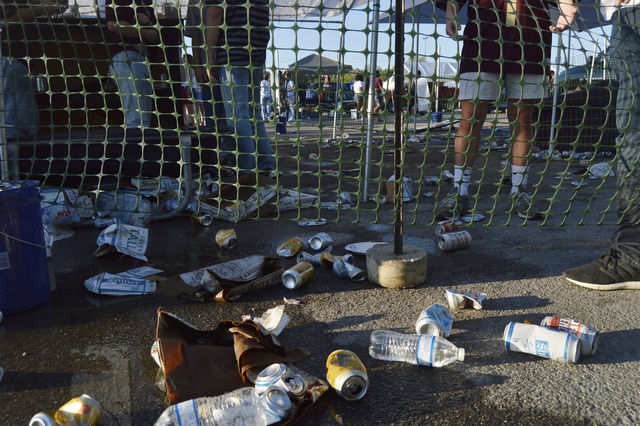For decades, tailgate has been a treasured part of Texas State’s football home game traditions. Amassing as much school spirit as Bobcats can hold, tailgating encourages football game attendance and student activity participation, as well as creating a fun environment for visitors and San Martians alike to enjoy.
Last year, Texas State adopted tailgate regulations that hinder vendors and student organization tents from participating in tailgate to the extent that they would like. Notably, the keg ban is the biggest offender.
Current tailgate policies do not allow kegs and require all alcohol vendors to have a TABC license, as well as sell food and non-alcoholic beverages strategically more than booze. This is all well and good, except that the keg clause harms the environment.
One of the campus’ prized features is the San Marcos River, which flows through it. Storm drains throughout campus collect water and debris, leading straight to the river. One of the largest student organizations, Human – Environment – Animal – Team—or HEAT—promotes environmental and humanitarian activism. The drainage system serves as a constant reminder of Texas State’s unique environmental position. Student involvement with groups such as HEAT further emphasizes the fact that Texas State’s student body cares about the environment.
Following current tailgate regulations, student organization tents will have to purchase an exorbitant amount of disposable beer cans to keep school spirit and tailgate attendance up. While attendees would ideally recycle these cans, it is unrealistic to assume they always will. While Texas State students generally do care about the environmental impact of their actions, it’s easy to forget about recycling amidst the busy and fun activities at tailgate. If Texas State reversed its position on kegs, the planetary savings would be huge at no additional cost to the participants.
Instead of having 700 or so empty cans of beer at the end, fans at tailgate will have approximately four empty kegs, which are 100 percent reusable. Instead of beer cans, which are thrown away once empty, guests would use cups which are easily recyclable, but more realistically, refillable. Similarly, most people bring reusable cups, such as Yetis and Tervis cups, to drink out of, which produce virtually no waste.
Drawing back to the university’s mandate on providing more food and non-alcoholic beverages than alcoholic ones, kegs are cheaper. Instead of spending all of the money on canned beer, those hosting tailgate tents can buy the same amount of beer for less through affordable kegs, thus allotting more on food and non-alcoholic beverages for guests. Joining the emphasis on decreasing sexual violence on college campuses, kegs lead to a safer environment when combined with more money spent on food and other drinks.
If the university wants to equip current and former Texas State students and visitors with the means to have school spirit and protect the environment, it needs to back off on tailgate regulations. If Texas State as a whole cares about the environment as much as it benefits from the environment, the keg ban at tailgate must go.
– Naomi Wick is a journalism senior
Categories:
The tailgate keg ban is bad for the environment
November 5, 2018
If Texas State reversed its position on kegs, the planetary savings would be huge at no additional cost to the participants.
Photo by Ali Mumbach
0
Donate to The University Star
Your donation will support the student journalists of Texas State University. Your contribution will allow us to purchase equipment and cover our annual website hosting costs.
More to Discover






